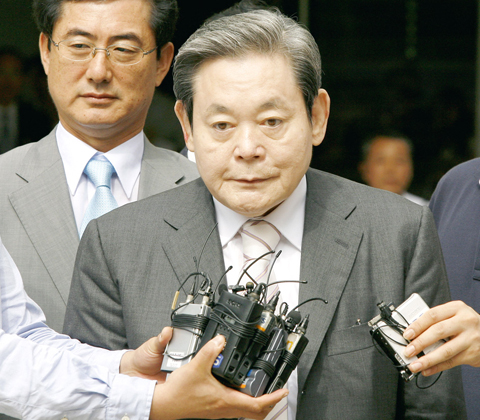South Korea’s richest man, Lee Kun-hee, returned yesterday as chairman of global giant Samsung Electronics, almost two years after stepping down following a probe into his business dealings.
Three months after Lee received a presidential pardon for tax evasion, the company said it needed his leadership “to take the upper hand in the global market amid the world economic crisis.”
The 68-year-old, however, expressed uncertainty about the future as Samsung tries to grow in the face of increasing low-cost Chinese competition.

PHOTO: AFP
“This is a time of real crisis. Global companies are crumbling. We don’t know what will happen to Samsung either,” a company statement quoted him as saying when he agreed to return at the request of its executives. “Within 10 years, all Samsung products may disappear. Now, we have to start anew. Let’s move on, with eyes set straight ahead.”
During his 20 years as chairman, Samsung Electronics became the world’s largest maker of computer memory chips and second-biggest manufacturer of mobile phones.
He resigned in April 2008 after being charged with tax evasion and breach of trust, but in December he received a special pardon so he could resume his suspended membership of the International Olympic Committee and work to bring the 2018 Winter Olympics to South Korea.
Samsung Electronics reported annual earnings of more than US$8 billion last year, along with record sales. It employs 164,600 people in 61 countries and is competing with Hewlett-Packard for the status of the world’s biggest technology firm by revenue, but Korea Investment Securities’ analyst Kim Jung-hoon said there was lingering uncertainty because of the effects of the global downturn as well as Chinese rivals that are fast catching up with South Korean firms.
“In the current situation, strong leadership is required. Lee’s return to the helm of the world’s largest producer of LCD panels and DRAM memory chips will be a great boon to the country’s economy,” Kim said.
Samsung Electronics shares closed up just 10,000 won (US$8.80), or 1.24 percent, at 819,000 won.
Kim Young-june, analyst with LIG Investment and Securities, told Dow Jones Newswires that Lee’s return was positive for the company’s management strategy.
“He might have decided to return to play a powerful leadership role in finding a future growth engine to capture a leading global position after the company survived the global financial crisis in good shape,” Kim Young-june said.
Solidarity for Economic Reform, a group campaigning for better corporate governance, however, said Samsung had turned its back on reform promises made two years ago.
“Samsung’s promise to reform made in April 2008 turned out to be a public fraud only aimed at winning a favorable court ruling,” it said in a statement.
Lee is the son of the founder of the Samsung group of companies, whose products or services touch every aspect of South Koreans’ lives. His own son, Jae-yong, is being groomed as a third-generation successor.

DAREDEVIL: Honnold said it had always been a dream of his to climb Taipei 101, while a Netflix producer said the skyscraper was ‘a real icon of this country’ US climber Alex Honnold yesterday took on Taiwan’s tallest building, becoming the first person to scale Taipei 101 without a rope, harness or safety net. Hundreds of spectators gathered at the base of the 101-story skyscraper to watch Honnold, 40, embark on his daredevil feat, which was also broadcast live on Netflix. Dressed in a red T-shirt and yellow custom-made climbing shoes, Honnold swiftly moved up the southeast face of the glass and steel building. At one point, he stepped onto a platform midway up to wave down at fans and onlookers who were taking photos. People watching from inside

A Vietnamese migrant worker yesterday won NT$12 million (US$379,627) on a Lunar New Year scratch card in Kaohsiung as part of Taiwan Lottery Co’s (台灣彩券) “NT$12 Million Grand Fortune” (1200萬大吉利) game. The man was the first top-prize winner of the new game launched on Jan. 6 to mark the Lunar New Year. Three Vietnamese migrant workers visited a Taiwan Lottery shop on Xinyue Street in Kaohsiung’s Gangshan District (崗山), a store representative said. The player bought multiple tickets and, after winning nothing, held the final lottery ticket in one hand and rubbed the store’s statue of the Maitreya Buddha’s belly with the other,

‘NATO-PLUS’: ‘Our strategic partners in the Indo-Pacific are facing increasing aggression by the Chinese Communist Party,’ US Representative Rob Wittman said The US House of Representatives on Monday released its version of the Consolidated Appropriations Act, which includes US$1.15 billion to support security cooperation with Taiwan. The omnibus act, covering US$1.2 trillion of spending, allocates US$1 billion for the Taiwan Security Cooperation Initiative, as well as US$150 million for the replacement of defense articles and reimbursement of defense services provided to Taiwan. The fund allocations were based on the US National Defense Authorization Act for fiscal 2026 that was passed by the US Congress last month and authorized up to US$1 billion to the US Defense Security Cooperation Agency in support of the

‘COMMITTED TO DETERRENCE’: Washington would stand by its allies, but it can only help as much as countries help themselves, Raymond Greene said The US is committed to deterrence in the first island chain, but it should not bear the burden alone, as “freedom is not free,” American Institute in Taiwan Director Raymond Greene said in a speech at the Institute for National Defense and Security Research’s “Strengthening Resilience: Defense as the Engine of Development” seminar in Taipei yesterday. In the speech, titled “Investing Together and a Secure and Prosperous Future,” Greene highlighted the contributions of US President Donald Trump’s administration to Taiwan’s defense efforts, including the establishment of supply chains for drones and autonomous systems, offers of security assistance and the expansion of